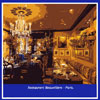The Art of French Cookery.
BY A.B. BEAUVILLIERS, RESTAURATEUR, PARIS. SECOND EDITION. LONDON: PRINTED FOR LONGMAN, HURST, REES, ORME, BROWN, AND GREEN. PATERNOSTER-ROW. 1825.
Second edition. 182x112 mm. 2 feps (one modern one original). Title Page. [1] (1)iv-vi Discourse. (1)viii-xiii To Mistresses of Families. (1)xv To the Cook. [1] (1)2-347. [1] 11p Menus. 1p Lines for notes. (1)362-380. 1fep. Internally very clean with untrimmed and many uncut pages. Half fawn calf with marbled boards. A very nice copy of the very scarce English translation.
- Antoine B. Beauvilliers, born 1754, died 31.1.1817, was a French restaurateur; He published 'l’Art du Cuisinier' in 2 volumes in 1814. A first English translation titled ‘The Art of French Cookery’ was published in 1824 and this second edition here published one year later. Beauvilliers was trained in the royal kitchen of the Bourbons, and served as steward in the household of the Count of Provence; the future King Louis XVIII. He created and opened La Grande Taverne de Londres at 26 rue de Richelieu in 1782, which it is claimed, was the first real restaurant in Paris. He was famous for greeting clients wearing a sword, which is amusingly suggested online, probably came in handy if they were a bit strapped when it came to paying. In 1792 the chaos of the French Revolution forced him to shut his doors and he was imprisoned for a while. Beauvilliers also spent some time working in England as association with the nobility in France might have endangered his life. Returning to Paris towards the end of the Directory however, he re-opened his restaurant, and re-named it the 'Taverne de Londres'. It was the first luxury restaurant to open in the aftermath of the Revolution. (Mosimann Cat.#23) The term restaurant already existed in France, but it previously referred only to small establishments that sold broth or bouillon as restoratives. In his establishment, Beauvilliers was the first to offer an 'a la carte' menu‘ (meaning from the card) offering his guests the opportunity to choose from a number of menu items, as opposed to the fixed 'table d’hote' menu of the past. Restaurants proliferated after the Revolution as the nobility’s former chefs returned and sought employment. They were in contrast to Antonin Careme who had stayed, lived and worked through the social upheaval. He represented the grandest statement of the old, court-based cuisine. He was one of the last practitioners of 'service a la francaise', that found expression in the great buffets and dinners of the nobility, serving as many as eighty dishes for one meal. The recipes in Beauvilliers book are very precise and written for the professional. In a time of great social and political change in France his book is also an important milestone on the gastronomic landscape of that country's great culinary tradition. Careme's style of service was no longer tenable. Beauvillier's restaurant was as different and modern as Adria's 'El Bulli' is today. A new age had dawned in France and pragmatic necessity dictated, as always.






click on image to enlarge

Antiquarian category
ref number:
11174